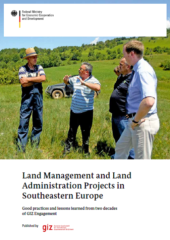
After the collapse of the former Soviet Union and the end of the latest Balkan wars, countries in Southeastern Europe had to reorganize their land management and land administration systems. Whereas in the Caucasus region privatization and first property registration were the main challenges, in the former Republic of Yugoslavia, essential objectives were the return of collectivized, confiscated property through restitution or (re)distribution, as well as the updating and harmonization of traditional land registry and cadaster systems and their conversion to modern systems.
For nearly 20 years, GIZ (former GTZ) has provided technical assistance in the field of land management, land administration, and in particular of cadaster to different countries in Southeastern Europe, including Georgia, Bosnia and Herzegovina, Serbia, Montenegro, Kosovo and Croatia. Whereas some projects uniquely focused on supporting land administration – hence land registry and cadaster – others concentrated more on the overall land management sector including spatial planning, land use issues, and land taxation.
The objective of this study was to analyze the experiences gained from GIZ projects in a maximum of four countries of the region. An essential aspect of the southeastern region was the consideration of EU standards and EU best practices during project implementation. On the basis of project approaches and duration, projects were selected as representative samples in Serbia, Bosnia and Herzegovina, Montenegro, and in Georgia.
This knowledge study should contribute to the knowledge management of GIZ as a learning organization, and to its inter-organizational learning, especially in the “land sector”. It should open a discussion about what can be learned from experience in the area of land management and land administration, particularly in countries in transition in Southeastern Europe.

Rejoignez-nous sur
LinkedIn